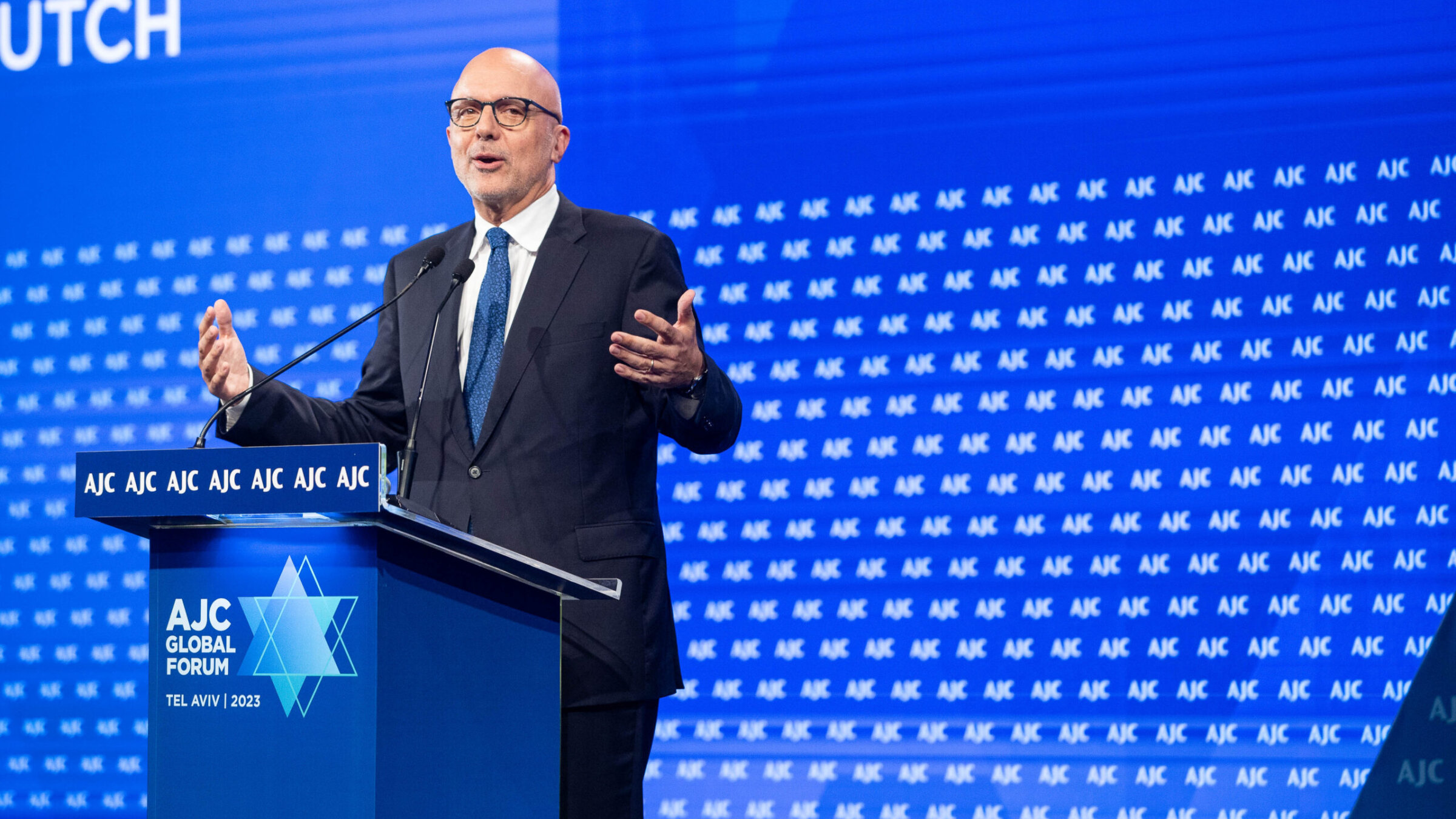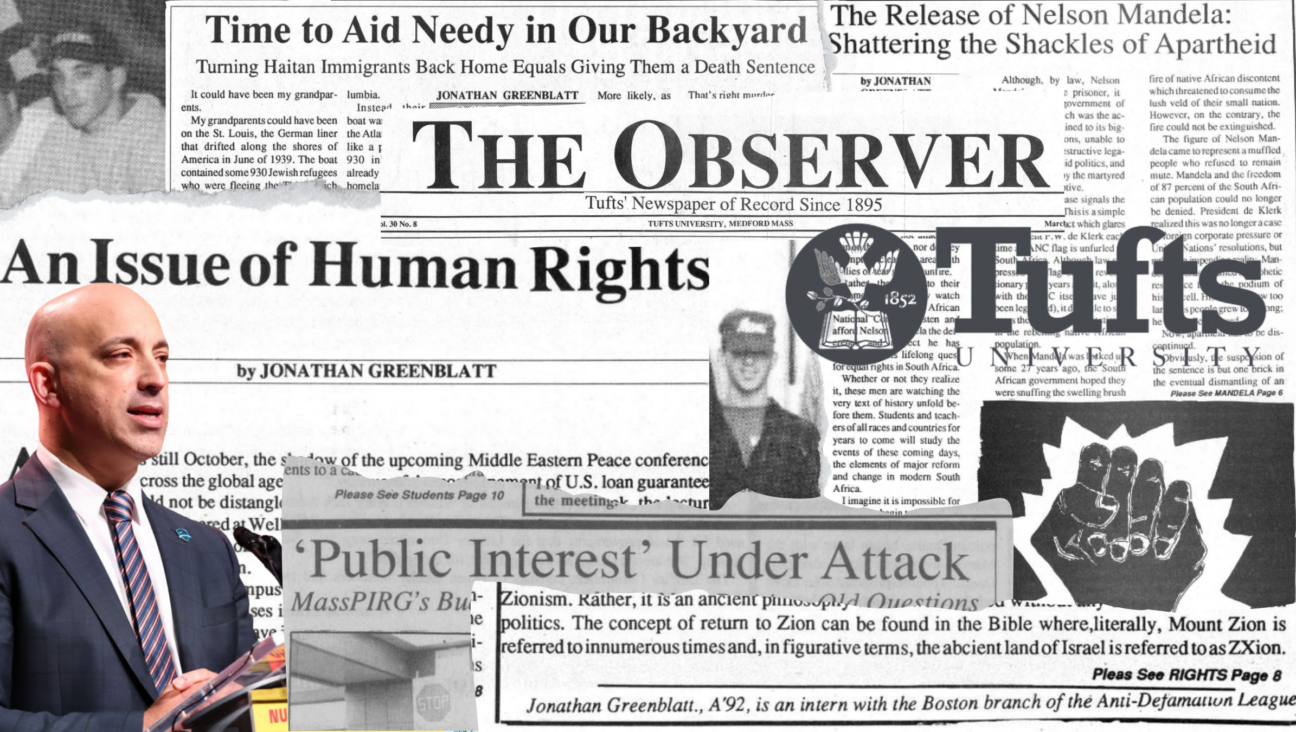Ted Deutch left Congress to head a Jewish organization. Can he find the ‘nuance’ that he seeks?

American Jewish Committee CEO Ted Deutch speaks at the organization’s Global Forum 2023 in Tel Aviv, Israel, June 14, 2023. (American Jewish Committee)
(JTA) — “Nonpartisan.” “Centrist.” The words seem quaint in an era of house-on-fire polarization, but Ted Deutch, marking one year as CEO of the American Jewish Committee, remains committed to what he calls “nuance” in fighting the community’s battles.
“Having been a Democratic member of Congress, I don’t think there’s anyone who better understands the threat that extreme partisanship poses to the country and, frankly, to the issues that we in our community care deeply about,” Deutch told the Jewish Telegraphic Agency in an interview last week. “And someone’s got to stake out a loud position that says, ‘We’re not going to be pulled to the far right or the far left.’”
Deutch succeeded David Harris as head of the 116-year-old AJC after 12 years representing South Florida in Congress, where he was an outspoken advocate for Israel and for combating antisemitism. One year into his new job, he’s carefully stoked AJC’s reputation as a sort of “State Department” of the organized Jewish community, with its citizen diplomacy on behalf of Jewish concerns and advocacy for Israel.
At the same time, he was drawn into unforeseen crises, like the outrage that followed online antisemitic rants by the rapper formerly known as Kanye West and and the tumult over the right-wing Israeli government’s judicial overhaul plans.
He’s also cultivated the AJC brand: temperate, somewhat patrician, more comfortable pulling together a task force or quietly meeting with a social media executive than issuing an angry press release or tweet. In a wide-ranging conversation, he discussed whether that approach remains viable — or even advisable — in the current political climate, why he thinks AJC speaks for a majority of American Jews and how he feels about reports that support for Israel is softening among his former Democratic colleagues.
Our conversation was edited for length and clarity.
It’s been almost a year since you left Congress to take your position at the American Jewish Committee. Do you miss politics?
I’m grateful to have had the opportunity and proud of what I was able to do on Jewish issues as chair of the Middle East, North Africa, and Global Counterterrorism Subcommittee. I chaired the Ethics Committee, which, especially around the time of the High Holidays, feels like a Jewish part of my work as well, frankly. And it was really great work. It’s also, as everyone knows, a bitterly partisan place. It was different when I left than it was when I got there seven terms before. And to have had the opportunity to leave what is perhaps the single most partisan place in America to lead a Jewish organization that allows me to work on the issues that are central to who I am to and do it every day of the week (except for Shabbat) — and to do it in a space that is nonpartisan and nuanced, and that recognizes the importance of working together — that’s been fantastic.
I want to get back to the issue of partisanship, especially as it applies to the Jewish community. But first I want to ask: The Anti-Defamation League and dozens of other organizations fight antisemitism. AIPAC lobbies for Israel. A network of community relations councils advocates for a Jewish agenda in local government. Why do we need the American Jewish Committee?
AJC is the global advocacy organization for the Jewish people. The mission is both straightforward and incredibly expansive. Our mission is to enhance the well-being of the Jewish people and advance democratic values. Yes, there are lots of organizations that work on various pieces of that, but we have for more than 116 years. We have been active in the United States and around the world now with 25 regional offices, and offices and representatives all across the globe, forging the kinds of relationships that are necessary in a nonpartisan way to advocate for the entirety of the Jewish people. There’s 16 million Jews in the world out of eight-and-a-half billion people and AJC’s role is to advocate on behalf of all of them — whether it’s working in Paris, to help ensure that the Macron government understands the challenges that Israel or the Jewish community faces, or our new regional office in San Diego or our regional office or in Atlanta that’s working on building relationships in the intergroup space.
The Jewish community may not be partisan in the sense that you are using the term, but it’s certainly polarized, with its own far right and far left. In recent years AJC has been seen as the ultimate “centrist” Jewish group, which to some is a compliment and to others a sign that it doesn’t take tough positions that could alienate those on either side of the political debate. Do you accept the label of “centrist” and if so why?
Proudly centrist. Yes, you’re right, in the Jewish community, like in the broader community, there are definitely extremes. But I absolutely believe that the vast majority of members of the Jewish community, like most people in America, don’t spend their time on the extremes. They don’t spend their time looking for ways to demonize one another. In the Jewish community that means finding opportunities to work together to strengthen the Jewish community, like giving voice to Jewish students or training the next generation of global Jewish leaders to stand and advocate for Jewish communities with governments around the world and here in our own country.
The suggestion that being centrist is somehow more challenging, with the noise coming from the extremes, highlights exactly why AJC’s role is so necessary. We’re going to call out antisemitism wherever we see it on the far left or the far right. We’re going to work with whoever we need to to advance the Jewish community’s interests.

“We’re not going to take positions that play into the hands of those whose interest is not in Israeli democracy, but whose interest is in finding ways to undermine Israel’s very right to exist,” said Ted Deutsch. (Courtesy AJC)
So let me give you a test case. AJC issued a statement on the judicial reform effort in Israel essentially criticizing the government’s rush to change the law, defending checks and balances, minority rights and civil liberties, and urging compromise. Other Jewish groups, alarmed by the government’s anti-democratic moves, have used much stronger language. Does AJC risk appearing out of step by in this case saying less?
I would absolutely disagree. I took a group of AJC leaders to Israel in January. The protests had been going on for a couple of weeks, as I recall, and we were the first organization to lay out our position with respect to judicial reform. And we haven’t wavered from it. We’ve engaged with all of the parties and that I think is perhaps a difference. Our view, as we said in Israel at the time, is that it’s not up to us to decide whether Israel decides [to change] their judicial system. That’s not our call. However, if they’re going to do anything that dramatically impacts the institutions that are fundamental to Israeli democracy, given the importance of democracy in Israel and to the Jewish people, if they’re going to do anything that’s going to affect that, it ought to come as a result of a process that is thoughtful and deliberative and that ultimately seeks compromise and respects civil liberties and minority rights. I said it in my meetings with the Knesset. I said it in my meeting with Prime Minister Netanyahu. And it’s why we’ve been so supportive of [Israeli] President [Isaac] Herzog’s efforts to reach a compromise. And when the “reasonableness” bill went through and it wasn’t the result of a deliberative process or compromise, we said so at the time.
What we’re not going to do as an organization that is fiercely pro-Israel, is we’re not going to take positions that play into the hands of those whose interest is not in Israeli democracy, but whose interest is in finding ways to undermine Israel’s very right to exist. So I’m not going to declare that this government is illegitimate. I’m not going to take sides in political battles. We have a principled approach that respects the importance of Israeli democracy for Israel and for Diaspora Jewry. And we point out that the fact that these protests have gone on as long as they have, using as their symbol the Israeli flag, is a perfect example of what Israel represents.
The fight against antisemitism has also become partisan, even within the Jewish community, with disagreement over whether the biggest threat is from a violent right or an anti-Israel left. Are you concerned about how it’s been made a partisan issue and a polarizing issue when it should be a consensus issue?
I don’t know how anyone who couldn’t have that concern. We do not have the luxury of picking and choosing which antisemites we’d like to focus on. It’s why we do so much in the Latino Jewish space, in the Black church space and why our Muslim Jewish Advisory Council matters so much. It’s why we’ve been so engaged with the Catholic Church. When I was in Congress, it was always easy to point out the antisemitism among those that you disagree with in partisan political terms. It’s a lot more challenging to call out the statements and behavior of those in your own party. That, unfortunately, is now something that we see beyond the halls of Congress.
Take the U.S. National Strategy to Counter Antisemitism, for example. It looks a lot like the AJC’s Call to Action Against Antisemitism, which we published several years ago, and we worked hard with the White House to help inform them in drafting their society-wide approach. There are over 200 specific action items that will help keep the Jewish community safe, and yet there are those who immediately pivot to the things that they think undermine the effort to fight antisemitism. That’s the challenge. We have to be able to come together and call out the antisemites wherever they are, and it’s hard. But again, it’s what most people want us to do in the real world.
Speaking of the National Strategy to Counter Antisemitism, which the Biden administration announced in May: I’m curious how you, as a former member of Congress, view the effectiveness of such strategies. Have you seen examples of an administration setting priorities like this that have a real effect in bringing about change, and do you worry that action plans like this sound great but won’t be enacted?
That’s why we immediately formed a task force with over 50 of our professionals from around the country and from 14 different departments of AJC, all with a goal of identifying every one of the 200 action items and making sure that it’s carried out. This cannot be a document that sits on a shelf. It can’t be a document that is important in this administration, but then future administration’s may push it aside. I can tell you just from the work that we’ve done, there are parts of the federal government that never really think about antisemitism. That’s why his plan is so significant. It went out to the bureaucrats, the policy people who are doing the work.
Can you give me an example? When AJC follows up with bureaucrats in government to discuss the strategy against antisemitism, what’s the ask?
Sure. We entered into an agreement with the Small Business Administration. Administrator [Isabella Casillas] Guzman came down to South Florida and we did a roundtable with small business owners. Small businesses represent the heart and soul of our economy. They don’t spend a lot of time thinking about how to fight antisemitism. They’re trying to earn a profit. So this roundtable will be replicated around the country with the regional offices of the SBA, to help them understand how to respond if there’s antisemitism in local small businesses and better understand the challenges that Jewish small business owners face. This is the kind of thing that can make a real difference, if for no other reason than there are lots of people who don’t think about antisemitism who will now join in this fight with us.
There’s one other quick example. We recently had a meeting with a number of mayors on Long Island. We’ve partnered with the Conference of Mayors to come up with a mayor’s guide to combating antisemitism, which these mayors are now committing to. So that when a national debate happens after Kanye decides to unload an antisemitic rant on the Jewish people online, there’s an opportunity to engage more allies with us than we’ve ever had before.
When you raise Kanye, we’re talking about the toxic effect of social media and celebrity and how someone with antisemitic ideas can own a platform with a couple of rants. Tell me about your outreach to social media companies. You saw how Elon Musk went after the Anti-Defamation League for calling out antisemitism on X/Twitter. What does AJC do differently in this regard?
I can tell you what we have done for some time now. A few weeks ago, I had a meeting with Linda Yaccarino, the CEO of X. And we were very, very clear about what we wanted and steps that they could take to make their platform safer for the Jewish community. And she made clear to us that she’s the CEO and that she welcomed our input. We’ve continued the conversations where we’ve offered to be helpful in a whole variety of ways, including helping to identify blind spots.
Such as?
We know that outside of the Jewish community, there are lots of antisemitic tropes that over millennia have led to really dire outcomes for the Jewish community, including violence and pogroms and expulsion from countries and and obviously, the worst case, the attempted annihilation of the Jewish people in the Holocaust. We understand that there are lots of people who need to be educated about why statements about Jews and power and conspiracy theories about Jewish control are so dangerous. That’s one of the ways that we’ve offered to be helpful.
We’ve also suggested some steps that can be taken right now. For example, if there’s a post on X that is antisemitic in nature, there’s not a way to respond and raise the issue for X and specifically identify it as antisemitic. Well, that’s an easy step. And then big picture: What we want from all of the social media companies first and foremost is for them to enforce their own rules. These are private companies. They have rules about what is and what isn’t tolerated on their platforms. We want them to enforce those rules to prevent antisemitism that’s a threat to the Jewish people.
And it was your takeaway that Yaccarino seemed amenable to these kinds of suggestions?
She was absolutely willing to continue to engage with us. We’ve continued to follow up and, and certainly my hope from that response is that we’ll see concrete actions.
I want to pivot to talk about a survey AJC did last year about millennials’ attitude toward Israel, which confirmed that American Jewish millennials are distancing themselves from Israel more than their elders. AJC’s message at the time was that the numbers were not quite as bad as some people feared — nevertheless, the trends are clear. How worried are you about disaffection for and alienation from Israel for younger Jews — and if you had a solution, what would it be?
Well, first of all, the top line of the survey was that three-quarters of American Jewish millennials believe that it’s important for Jews to have close ties with Israel. So I think that’s significant. That’s something that we see in the work that we do every day.
There are others who have questions about Israel’s policies, and I’m not writing off young Jews who come from a place of concern about Israel. It’s a serious issue. We engage in it. It’s why we devote so much attention through our our high school division, our Campus Global Board, our young leadership division, in ensuring that we’re addressing these issues that we’re discussing, but that we’re also capitalizing on the incredible energy and enthusiasm and passion of young people who absolutely want to join the effort with their fellow Jews from around the world in supporting one another and supporting Israel.
But it’s also a little more complex. We don’t shy away from the conversations that young people want to have. I don’t believe that the way to address concerns about millennials is simply to lecture them and tell them that if you simply understand this piece of history, then you’ll understand why this should all be so important to you. I was in France a few months ago and heard from a number of Jewish university students that when they went to parties, as soon as someone learned they were Jewish, they were bombarded with questions about Israel and the Palestinians. And so for some, [in terms of their distancing from Israel,] it’s more an issue of not wanting to define their Jewish identity [in relation to the Israeli-Palestinian conflict]. It doesn’t mean that they’re anti-Israel.

A delegation from the American Jewish Committee marches in the Celebrate Israel parade in New York City, June 4, 2023. (Philissa Cramer)
The anecdote about the French students reminds me of a critique, not just about AJC but many Jewish mainstream institutions, that by making Israel so integral to what it means to be an American Jew, it came at the expense of creating a distinct American Jewish identity. Do you think Jewish organizations somehow share in the blame for that, in the sense that they tied the two identities too closely together?
No, I don’t. Israel means a lot of things to a lot of different people. Some people engage in Israel because they care about Israel as a Jewish homeland. Some people recognize it as a refuge for Jews from around the world. For some it’s based purely on the importance of Israel in our prayers.
I do think, however, that this gets to a broader point of what we should be advocating for. If the only thing that we’re doing as a community is responding to antisemitism, if we’re letting the people who hate Jews define the Jewish community’s mission, or that the only Jewish history that we’re really focused on is the Holocaust, then we’re failing our young people. The big question that I find myself asking, especially around the holidays, is what happens when we win the battle against antisemitism? That’s why it is so important for us to be not just a global organization, but a proudly Jewish organization. We have to understand who we are so that others can understand who we are and what we’ve contributed to the world and to America. And that requires us to learn a little more and be understandably proud of what it means to be a Jew in America.
Can you give me a specific example of AJC programming that’s about inculcating this sort of Jewish pride?
Our Leaders for Tomorrow program for high school teaches kids to not just be proud, proud Jews and and proudly pro-Israel but helps them understand what we’ve contributed throughout history. And our center for Contemporary Jewish Life does educational programs that lead the way on this whole Jewish-and-proud effort.
You succeeded David Harris, who led the organization for over 30 years. What goals did you set out for AJC when you took over and what have you achieved? What hasn’t been done and are you most anxious to get going?
First of all, AJC for over 116 years has been a trusted — I would argue, the most trusted — voice across the globe in representing the Jewish community. And I came in committed to expanding on that legacy. Right at the beginning I wanted to make sure that people know who we are. There’s no benefit when you’re a global NGO in being referred to as “the best kept secret,” which is something that I heard from time to time when I started.
But in my first week Kanye went on his antisemitic rant against the Jews and suddenly, I found myself in front of cameras and talking to reporters about antisemitism because this is something that AJC had been dealing with for decades in Europe. It’s the reason that we worked so hard with the White House and in helping to inform the creation of the national strategy.
When I first announced I was taking this job we were in a different place in Israel. The government was different. It was the most diverse government in the history of Israel, and now we have the most conservative government in the history of Israel. But that hasn’t stopped us from continuing to work hard to expand Israel’s place in the world and expand the Abraham Accords. So we’ve continued to meet with leaders from throughout the Gulf and to build out the work that we do in our offices in Jerusalem and in Abu Dhabi to really help propel the Abraham Accords forward.
We also recognize the need to continue to expand, which is why we opened the new office in San Diego in my first year, deepening our relationship and our political activity in Denver and in the Mountain States and embarking on a major expansion in Florida.
What haven’t I been able to do? For my first 12 months after leaving Congress, I’ve been barred [by House ethics rules] from engaging my former colleagues on any substantive issues. Come Oct. 1, as someone who has deep personal relationships with members of Congress across the aisle, I’ll be re-engaging with Democratic leaders and Republican leaders in ways that will strengthen our place in Washington and in turn, the Jewish community’s and Israel’s place in the world.
I want to ask about that. Within the Democratic Party, there has been some drift away from Israel, and there’s been some harsh criticism from certain lawmakers on the party’s left. Are you concerned that the party is not as forthrightly pro-Israel as it used to be? And are you worried about Israel itself becoming a partisan issue in Congress?
There have been people who have been trying to make Israel a partisan issue for a long time. I fought that when I was in Congress. Our role as a nonpartisan organization, as a centrist organization, is to call out those on both sides who try to weaponize the issue and engage in the use of antisemitic tropes. We work closely with those Republicans who are fiercely pro-Israel. And you also have to look at Democratic leader Hakeem Jeffries, who recently led a group of Democratic lawmakers to Israel. His commitment to Israel is very strong and firm. Yeah, there’s a small minority who tried to politicize this issue. There’s a small minority who take positions that I think need to be called out. I did that when I was on the floor of the House. We’re going to work with leadership to advance the issues of the Jewish community. It’s something that I look forward to doing with people that I’ve known for a long time and based on relationships that I think will be really helpful.
This article originally appeared on JTA.org.

I hope you appreciated this article. Before you go, I’d like to ask you to please support the Forward’s award-winning journalism this Passover.
In this age of misinformation, our work is needed like never before. We report on the news that matters most to American Jews, driven by truth, not ideology.
At a time when newsrooms are closing or cutting back, the Forward has removed its paywall. That means for the first time in our 126-year history, Forward journalism is free to everyone, everywhere. With an ongoing war, rising antisemitism, and a flood of disinformation that may affect the upcoming election, we believe that free and open access to Jewish journalism is imperative.
Readers like you make it all possible. Right now, we’re in the middle of our Passover Pledge Drive and we still need 300 people to step up and make a gift to sustain our trustworthy, independent journalism.
Make a gift of any size and become a Forward member today. You’ll support our mission to tell the American Jewish story fully and fairly.
— Rachel Fishman Feddersen, Publisher and CEO
Join our mission to tell the Jewish story fully and fairly.
Only 300 more gifts needed by April 30

























